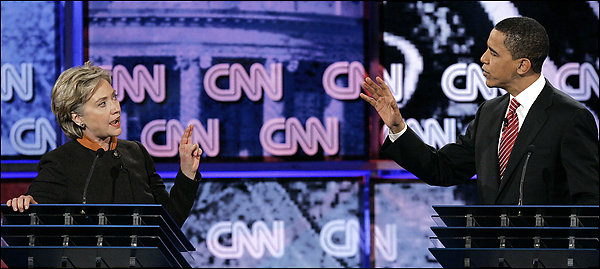
“I understand that most viewers want to know, how am I going to get helped in terms of paying my health care? How am I going to get help being able to go to college? All those things are important. But what’s also important that people are not just willing to say anything to get elected. And that’s what I have tried to do in this campaign, is try to maintain a certain credibility.I don’t mind having policy debates with Senator Clinton or Senator Edwards. But what I don’t enjoy is spending the week or two weeks or the last month having to answer to these kinds of criticisms that are not factually accurate.“
The faux bonhomie of Nevada’s roundtable well behind them, the Democratic candidates started throwing haymakers in tonight’s lively South Carolina debate. [Transcript.] Unlike the last two meetings, I’m not going spend a lot of time on a full-fledged summary, since — when it gets this heated onstage — I don’t think it’s particularly useful. Judging from the comment threads at the various political sites, people will see what they want to see. Clinton supporters are coming out of the woodwork to say she won the night. Well, that was definitely not my impression.
For my part, I was glad to see Barack Obama strongly counter Clinton’s continued distortions in the first hour, and finally push back on Clinton’s dubious “35 years of change” line (including, as it does, twelve years at the Rose Law Firm, which has been billed as Arkansas’ “ultimate establishment law firm.”) And he did a great job in the seated second hour of reasserting his positives — the funny and gracious “first black president” answer, for example — while staying on message.
Hillary Clinton, on the other hand, was at her evasive, misleading, Rovian worst. She did ok on the first question, about the economic stimulus package, but went rapidly downhill thereafter. Rather than running on her own record, She repeated her distortions about Reagan. She repeated her husband’s distortions about Obama’s stance on Iraq. She tried (and failed) to turn Obama’s present votes in the Illinois Senate into a vote for sexual abuse. And she like her husband — basically accused Obama (wrongly) of being Clintonian. (“[I]t is very difficult having a straight-up debate with you, because you never take responsibility for any vote, and that has been a pattern.“)
Clinton also tried to inject the Rezko story into the debate. For those not following, Tony Rezko is a clearly shady Chicago businessmen with whom Obama had dealings with as a state legislator, and an iffy-looking land deal thereafter. An error in judgment, to be sure, and one he’s apologized for (even though it looks like there’s no there there.) Now it’s a fair thing to bring up, as Obama himself admitted. But,to be honest, Rezko is really not a road Hillary Clinton wants to go down. For one, you’d think the Clintons — of all people — would try to avoid insinuating corruption-by-association when it comes to land deals. For another, do Norman Hsu, Marc Rich, and Johnny Chung ring a bell? Shady operators in the margins are and have been the Clintons’ forte.
But I digress. Once the fur started to fly, John Edwards got plugged into the “above the fray” role by default, which may have helped him out among undecideds, I guess. Still, I was glad to see he directed attacks at both Obama and Clinton as he felt warranted, which should prevent another embarrassing post-debate spin along the lines of “the men were picking on me.” But you never know. After all the outrageous displays of intellectual dishonesty from the Clinton camp, both tonight and over the past few weeks, I’d put nothing past them at this point.
